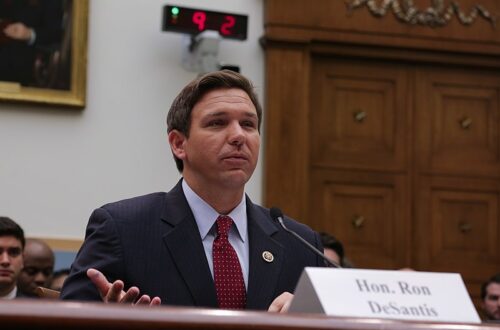Recently, the state of Florida filed a petition to prevent political speech from being censored on social media platforms such as Twitter and Facebook, in accordance with Gov. Ron DeSantis’ anti-censorship law.
By asking justices to reinstate Senate Bill 7072, a 2021 law passed by DeSantis that prevents the censorship of political speech and information on social platforms, Florida is aiming to provide citizens with more accurate and less biased political news posted on social media.
The state’s legal team stressed the importance of transparent public discourse and competitive ideas.
“When social media companies abuse their market dominance to silence speech, they distort the marketplace of ideas,” the team said in a statement. “The question whether the First Amendment essentially disables the states — and presumably the federal government too — from meaningfully addressing those distortions should be answered by this [Supreme] Court, and it should be answered now.”
DeSantis and his team have stressed the importance of fighting against this issue to avoid limiting citizens’ access to prevalent information, especially regarding politics and upcoming elections. His apparent interest in the issue resulted from Twitter’s ban of former President Donald Trump after the Jan. 6 Capitol riot.
Recently, the U.S. Fifth Circuit Court of Appeals reasoned that Texas is constitutionally allowed to ban social media apps from censoring users, which directly conflicts with Florida’s current status on a similar social media law. The clash of opinions could potentially cause another appeal to the Supreme Court.
Published on NetChoice, the petition strives to resolve this conflict between both circuits’ rulings by communicating that the restriction of individuals’ access to information may implicate questions of nationwide importance. Essentially, Florida is arguing this could pose a threat to the First Amendment by restricting freedom of speech.
“[The Eleventh Circuit’s reasoning] dealt a mortal blow to the power of governments, state and federal, to protect their citizens’ access to information in the modern public square” said DeSantis’ legal team and Cooper & Kirk’s law firm.
The state’s legal team considers the lack of access to information on social media platforms to be detrimental to society which aligns with DeSantis’ opinion on this matter. DeSantis said the strain of information is primarily targeted toward conservative viewpoints.
The petition aims to implement penalties for social media behemoths if they choose to violate the conditions stated in the petition such as $250,000 fines per day for banning state politicians. A condition of the petition includes that these tech companies periodically release statements about issues such as blocking information or banning users from their platforms to hold them accountable for fulfilling the compelled speech doctrine, principles where the government cannot force a certain expression upon citizens.
Carl Szabo, vice president of NetChoice and general counsel, expressed his support for DeSantis’ anti-censorship law in a statement.
“We look forward to seeing Florida in court and having the lower court’s decision upheld. We have the Constitution and over a century of precedent on our side,” he said.
To set forth a different stance, journalist Karen Gullo offers an opposing perspective to the controversial senate bill by noting, “While platforms sometimes say they are open to anyone, in practice they have always required users to accept their terms of service and community standards. So, in reality, social media users are not free to speak on the platform in any way they choose — they can’t post comments that violate the platform rules, the court noted.” By exploring the possible disadvantages of SB 7072, the court acknowledged the mutual consensus that users agree to while using these social media platforms and argue that there cannot be full freedom of speech due to this
As the digital age continues to rapidly expand in the lives of Americans, Judge Kevin Newsom said, “Whatever the challenges of applying the Constitution to ever-advancing technology, the basic principles of freedom of speech and the press, like the First Amendment’s command, do not vary when a new and different medium for communication appears.”
Despite the ever-growing list of social media apps being created, Newsom affirmed there needs to be a certain standard for all social media apps no matter when they were created. Fundamentally, the requirement of hosting third-party content will be applied to every platform to guarantee freedom of speech.
The justices’ decision on the reinstatement of SB 7072 will ultimately determine how censorship will be handled on social media platforms.
Check out other recent articles from the Florida Political Review here.
Featured image: Inscription of the First Amendment outside of Independence Hall. (Unmodified photo by Robin Klein used under a Creative Commons License https://bit.ly/3fMCd7a.)





